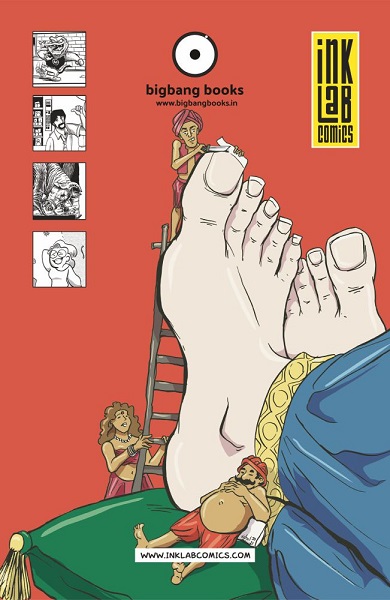After the successful launch of the first issue of INKLAB: Disease, Big Bang Books is back with its second edition themed around Consume, highlighting various interpretations of consumerism and capitalism.
The previous issue is based on Disease and featured four different stories like Common, Jhootha Paani, Dyspepsia, The trouble with Allopathy that focused on mundane diseases and their cure. INKLAB believes in bringing revolution among the readers while reading the comics in the anthology.
AnimationXpress got in touch with Big Bang Books publisher Bhuwan Shrivastava to know more about their second edition Consume which throws light on the consumerist society. Commenting on whether INKLAB is bringing revolution among the public, Shrivastava said, “Reading itself can be a revolutionary act. INKLAB facilitates storytelling in alternative formats for adults by using comics. It’s a fresh break from trying to find entertainment on streaming websites. It is even more important in India since there are no comic magazines for adults. Tongue in cheek with relatable to absurd stories is slowly but surely changing our perceptions of comics, stories, and magazines.”
Consume is 56 pages long comic book and has four standalone stories from comic creators Rahil Mohsin, Lokesh Khodke, Mitali Panganti, Falah Faisal, and Anukriti Singh, with vibrant cover art by Vishal Bharadwaj. On asking what made the writers come up with consumerism and capitalism theme, Shrivastava added, “INKLAB is a quarterly magazine with a different theme for each issue; the prompt consumerism was the push any creator needed. But truth be told living in a capitalist-consumerist society, all of our stories and observations have a shadow of the same. In recent times, we see more of this disparity in the use of resources from person to person. Consumerism is so deeply embedded in the society that no matter the standing of the person, they are thinking of consuming.”
He further added, “The idea of the comic is not to discuss consumerism but to understand, observe and sometimes even find humour in it. The stories are sharp observations of consumerism in daily lives as writers have dissected consumers as they are packaged. The critical engagement with the consumer in us happens for a reader when they read the comics by different creators and look at their many interpretations.”
The storyline of the four comic stories are as follows:
Snot by Rahil Mohsin tells the story of how the consumer is also being consumed.
The Roaring 20s by Falah Faisal and Anukriti Singh critically examines, questions, and argues, a happy consumer life/lie.
Saand Nama by Lokesh Khodke looks at long-term changes of consumerism and how the consumer and what is being consumed transforms with little care for anything else.
Content by Mitali explores the pressure to be constantly creating for people to consume.
Consumerism and Capitalism have both positive and negative impacts on the environment. It comes with its profits and loss, and commenting on how it is portrayed in their story, Shrivastava added, “The impact, and the relationship of consumerism, society, and environment is portrayed in the magazine. The creators have engaged with consumerism with subtlety to blatant exaggeration; to dissect different aspects of consumerism in society, on the environment, and on a personal level.”
Elaborating on whether the book shares alternatives or gives inputs on how to manage environmental degradation caused by consumerism, Shrivastava commented, “The environmental impact of consumerism is more and more under scrutiny these days. But the beauty, or rather the adaptability of consumerism is such that the alternatives and solutions to the damage are also being packaged and sold for us to consume. The book makes us question and think about the consumer in us and encourages the reader to be more conscious about what they are consuming. We hope that by being more mindful and critical we can check the degradation we cause and also hold those responsible accountable. Beyond this, the book leaves the scope of finding solutions of environmental degradation to experts – it is not meant to be prescriptive and we don’t claim to have the answers, only stories, and art that comes from living in this world.”
He also talked about major challenges he faced while coming up with this comic book during this pandemic. “The book was compiled and published when India was going through the second wave of Covid-19. Between the lockdowns and the pandemic, it was quite a challenge to publish the book and for it to reach our readers. The printing was delayed, and many more problems were faced by everyone. The pandemic has been a difficult time for all of us. We are grateful that our readers understood and waited patiently for their issues.”
Mentioning the future plans, Shrivastava concluded, “The next issue of INKLAB is going to be coming out soon. The theme of the third issue will be Freedom, which is as tricky as Consume in present times, and we will be opening calls for our fourth issue soon.”



